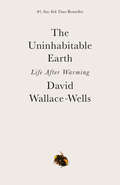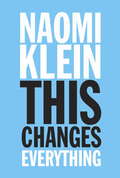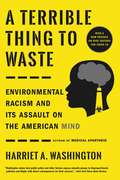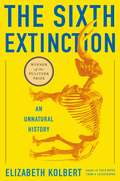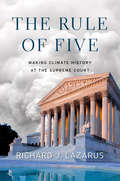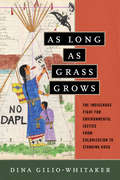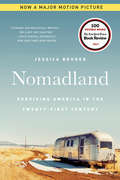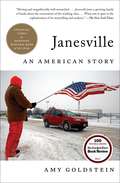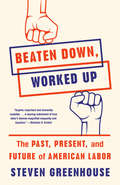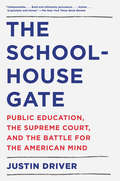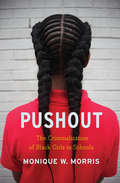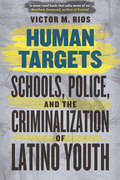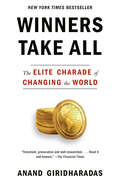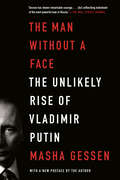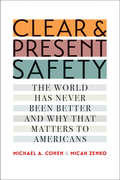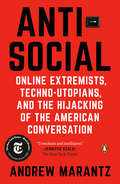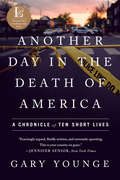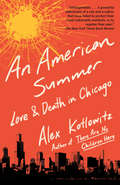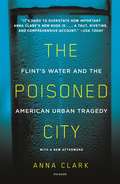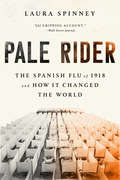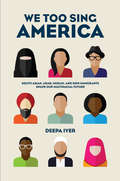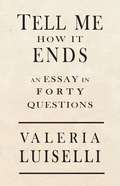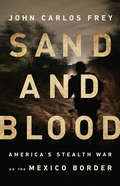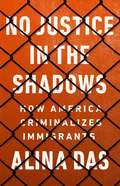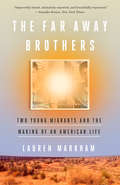Special Collections
NYPL's 2020 Election Reading List
Description: The books on this list cover voting issues including healthcare, education, climate change, and foreign policy, and explore subjects including political polarization, the media, and movements toward greater justice and equity.
- Table View
- List View
The Uninhabitable Earth
by David Wallace-WellsIt is worse, much worse, than you think. If your anxiety about global warming is dominated by fears of sea-level rise, you are barely scratching the surface of what terrors are possible. In California, wildfires now rage year-round, destroying thousands of homes. Across the US, “500-year” storms pummel communities month after month, and floods displace tens of millions annually.
This is only a preview of the changes to come. And they are coming fast. Without a revolution in how billions of humans conduct their lives, parts of the Earth could become close to uninhabitable, and other parts horrifically inhospitable, as soon as the end of this century.
In his travelogue of our near future, David Wallace-Wells brings into stark relief the climate troubles that await—food shortages, refugee emergencies, and other crises that will reshape the globe. But the world will be remade by warming in more profound ways as well, transforming our politics, our culture, our relationship to technology, and our sense of history. It will be all-encompassing, shaping and distorting nearly every aspect of human life as it is lived today.
Like An Inconvenient Truth and Silent Spring before it, The Uninhabitable Earth is both a meditation on the devastation we have brought upon ourselves and an impassioned call to action. For just as the world was brought to the brink of catastrophe within the span of a lifetime, the responsibility to avoid it now belongs to a single generation.
A New York Times Bestseller
This Changes Everything
by Naomi KleinThe most important book yet from the author of the international bestseller The Shock Doctrine, a brilliant explanation of why the climate crisis challenges us to abandon the core “free market” ideology of our time, restructure the global economy, and remake our political systems.
In short, either we embrace radical change ourselves or radical changes will be visited upon our physical world. The status quo is no longer an option.
In This Changes Everything Naomi Klein argues that climate change isn’t just another issue to be neatly filed between taxes and health care. It’s an alarm that calls us to fix an economic system that is already failing us in many ways. Klein meticulously builds the case for how massively reducing our greenhouse emissions is our best chance to simultaneously reduce gaping inequalities, re-imagine our broken democracies, and rebuild our gutted local economies. She exposes the ideological desperation of the climate-change deniers, the messianic delusions of the would-be geoengineers, and the tragic defeatism of too many mainstream green initiatives. And she demonstrates precisely why the market has not—and cannot—fix the climate crisis but will instead make things worse, with ever more extreme and ecologically damaging extraction methods, accompanied by rampant disaster capitalism.
Klein argues that the changes to our relationship with nature and one another that are required to respond to the climate crisis humanely should not be viewed as grim penance, but rather as a kind of gift—a catalyst to transform broken economic and cultural priorities and to heal long-festering historical wounds. And she documents the inspiring movements that have already begun this process: communities that are not just refusing to be sites of further fossil fuel extraction but are building the next, regeneration-based economies right now.
Can we pull off these changes in time? Nothing is certain. Nothing except that climate change changes everything. And for a very brief time, the nature of that change is still up to us.
A Terrible Thing to Waste
by Harriet WashingtonDid you know...Middle-class African American households with incomes between $50,000 and $60,000 live in neighborhoods that are more polluted than those of very poor white households with incomes below $10,000.
When swallowed, a lead-paint chip no larger than a fingernail can send a toddler into a coma -- one-tenth of that amount will lower his IQ.
Nearly two of every five African American homes in Baltimore are plagued by lead-based paint. Almost all of the 37,500 Baltimore children who suffered lead poisoning between 2003 and 2015 were African American.From injuries caused by lead poisoning to the devastating effects of atmospheric pollution, infectious disease, and industrial waste, Americans of color are harmed by environmental hazards in staggeringly disproportionate numbers.
This systemic onslaught of toxic exposure and institutional negligence causes irreparable physical harm to millions of people across the country-cutting lives tragically short and needlessly burdening our health care system. But these deadly environments create another insidious and often overlooked consequence: robbing communities of color, and America as a whole, of intellectual power.
The 1994 publication of The Bell Curve and its controversial thesis catapulted the topic of genetic racial differences in IQ to the forefront of a renewed and heated debate.
Now, in A Terrible Thing to Waste, award-winning science writer Harriet A. Washington adds her incisive analysis to the fray, arguing that IQ is a biased and flawed metric, but that it is useful for tracking cognitive damage.
She takes apart the spurious notion of intelligence as an inherited trait, using copious data that instead point to a different cause of the reported African American-white IQ gap: environmental racism - a confluence of racism and other institutional factors that relegate marginalized communities to living and working near sites of toxic waste, pollution, and insufficient sanitation services.
She investigates heavy metals, neurotoxins, deficient prenatal care, bad nutrition, and even pathogens as chief agents influencing intelligence to explain why communities of color are disproportionately affected -- and what can be done to remedy this devastating problem. Featuring extensive scientific research and Washington's sharp, lively reporting, A Terrible Thing to Waste is sure to outrage, transform the conversation, and inspire debate.
The Sixth Extinction
by Elizabeth KolbertA major book about the future of the world, blending intellectual and natural history and field reporting into a powerful account of the mass extinction unfolding before our eyes.
Over the last half a billion years, there have been five mass extinctions, when the diversity of life on earth suddenly and dramatically contracted. Scientists around the world are currently monitoring the sixth extinction, predicted to be the most devastating extinction event since the asteroid impact that wiped out the dinosaurs. This time around, the cataclysm is us.
In The Sixth Extinction, two-time winner of the National Magazine Award and New Yorker writer Elizabeth Kolbert draws on the work of scores of researchers in half a dozen disciplines, accompanying many of them into the field: geologists who study deep ocean cores, botanists who follow the tree line as it climbs up the Andes, marine biologists who dive off the Great Barrier Reef. She introduces us to a dozen species, some already gone, others facing extinction, including the Panamian golden frog, staghorn coral, the great auk, and the Sumatran rhino.
Through these stories, Kolbert provides a moving account of the disappearances occurring all around us and traces the evolution of extinction as concept, from its first articulation by Georges Cuvier in revolutionary Paris up through the present day. The sixth extinction is likely to be mankind's most lasting legacy; as Kolbert observes, it compels us to rethink the fundamental question of what it means to be human.
Pulitzer Prize Winner
The Rule of Five
by Richard J. LazarusA renowned Supreme Court advocate tells the inside story of Massachusetts v. EPA, the landmark case that made it possible for the EPA to regulate greenhouse gasses—from the Bush administration’s fierce opposition, to the internecine conflicts among the petitioners, to the razor-thin 5–4 victory.
As Long as Grass Grows
by Dina Gilio-WhitakerThe story of Native peoples' resistance to environmental injustice and land incursions, and a call for environmentalists to learn from the Indigenous community's rich history of activismThrough the unique lens of "Indigenized environmental justice," Indigenous researcher and activist Dina Gilio-Whitaker explores the fraught history of treaty violations, struggles for food and water security, and protection of sacred sites, while highlighting the important leadership of Indigenous women in this centuries-long struggle. As Long As Grass Grows gives readers an accessible history of Indigenous resistance to government and corporate incursions on their lands and offers new approaches to environmental justice activism and policy. Throughout 2016, the Standing Rock protest put a national spotlight on Indigenous activists, but it also underscored how little Americans know about the longtime historical tensions between Native peoples and the mainstream environmental movement. Ultimately, she argues, modern environmentalists must look to the history of Indigenous resistance for wisdom and inspiration in our common fight for a just and sustainable future.
Nomadland
by Jessica BruderThe end of retirement?
From the beet fields of North Dakota to the National Forest campgrounds of California to Amazon’s CamperForce program in Texas, employers have discovered a new, low-cost labor pool, made up largely of transient older Americans. Finding that social security comes up short, often underwater on mortgages, these invisible casualties of the Great Recession have taken to the road by the tens of thousands in late-model RVs, travel trailers, and vans, forming a growing community of nomads: migrant laborers who call themselves “workampers.”
On frequently traveled routes between seasonal jobs, Jessica Bruder meets people from all walks of life: a former professor, a McDonald’s vice president, a minister, a college administrator, and a motorcycle cop, among many others—including her irrepressible protagonist, a onetime cocktail waitress, Home Depot clerk, and general contractor named Linda May.
In a secondhand vehicle she christens “Van Halen,” Bruder hits the road to get to know her subjects more intimately. Accompanying Linda May and others from campground toilet cleaning to warehouse product scanning to desert reunions, then moving on to the dangerous work of beet harvesting, Bruder tells a compelling, eye-opening tale of the dark underbelly of the American economy—one that foreshadows the precarious future that may await many more of us. At the same time, she celebrates the exceptional resilience and creativity of these quintessential Americans who have given up ordinary rootedness to survive. Like Linda May, who dreams of finding land on which to build her own sustainable “Earthship” home, they have not given up hope.
A New York Times Bestseller
Janesville
by Amy Goldstein* Financial Times and McKinsey Business Book of the Year * Winner of the J. Anthony Lukas Book Prize * 800-CEO-READ Business Book of the Year * A New York Times Notable Book * A Washington Post Notable Book * An NPR Best Book of 2017 * A Wall Street Journal Best Book of 2017 * An Economist Best Book of 2017 * A Business Insider Best Book of 2017 * &“A gripping story of psychological defeat and resilience&” (Bob Woodward, The Washington Post)—an intimate account of the fallout from the closing of a General Motors assembly plant in Janesville, Wisconsin, and a larger story of the hollowing of the American middle class.This is the story of what happens to an industrial town in the American heartland when its main factory shuts down—but it&’s not the familiar tale. Most observers record the immediate shock of vanished jobs, but few stay around long enough to notice what happens next when a community with a can-do spirit tries to pick itself up. Pulitzer Prize–winning reporter Amy Goldstein spent years immersed in Janesville, Wisconsin, where the nation&’s oldest operating General Motors assembly plant shut down in the midst of the Great Recession. Now, with intelligence, sympathy, and insight into what connects and divides people in an era of economic upheaval, Goldstein shows the consequences of one of America&’s biggest political issues. Her reporting takes the reader deep into the lives of autoworkers, educators, bankers, politicians, and job re-trainers to show why it&’s so hard in the twenty-first century to recreate a healthy, prosperous working class. &“Moving and magnificently well-researched...Janesville joins a growing family of books about the evisceration of the working class in the United States. What sets it apart is the sophistication of its storytelling and analysis&” (Jennifer Senior, The New York Times). &“Anyone tempted to generalize about the American working class ought to meet the people in Janesville. The reporting behind this book is extraordinary and the story—a stark, heartbreaking reminder that political ideologies have real consequences—is told with rare sympathy and insight&” (Tracy Kidder, Pulitzer Prize–winning author of The Soul of a New Machine).
Beaten Down, Worked Up
by Steven GreenhouseFrom the longtime New York Times labor correspondent, an in-depth look at working men and women in America, the challenges they face, and how they can be re-empoweredIn an era when corporate profits have soared while wages have flatlined, millions of Americans are searching for ways to improve their lives, and they're often turning to labor unions and worker action, whether #RedforEd teachers' strikes or the Fight for $15. Wage stagnation, low-wage work, and blighted blue-collar communities have become an all-too-common part of modern-day America, and behind these trends is a little-discussed problem: the decades-long decline in worker power. Steven Greenhouse sees this decline reflected in some of the most pressing problems facing our nation today, including income inequality, declining social mobility, the gender pay gap, and the concentration of political power in the hands of the wealthy. He rebuts the often-stated view that labor unions are outmoded--or even harmful--by recounting some of labor's victories, and the efforts of several of today's most innovative and successful worker groups. He shows us the modern labor landscape through the stories of dozens of American workers, from G.M. workers to Uber drivers, and we see how unions historically have empowered--and lifted--the most marginalized, including young women garment workers in New York in 1909, black sanitation workers in Memphis in 1968, and hotel housekeepers today. Greenhouse proposes concrete, feasible ways in which workers' collective power can be--and is being--rekindled and reimagined in the twenty-first century.
The Schoolhouse Gate
by Justin DriverAn award-winning constitutional law scholar at the University of Chicago (who clerked for Judge Merrick B. Garland, Justice Stephen Breyer, and Justice Sandra Day O’Connor) gives us an engaging and alarming book that aims to vindicate the rights of public school students, which have so often been undermined by the Supreme Court in recent decades.
Judicial decisions assessing the constitutional rights of students in the nation’s public schools have consistently generated bitter controversy. From racial segregation to unauthorized immigration, from antiwar protests to compulsory flag salutes, from economic inequality to teacher-led prayer—these are but a few of the cultural anxieties dividing American society that the Supreme Court has addressed in elementary and secondary schools. The Schoolhouse Gate gives a fresh, lucid, and provocative account of the historic legal battles waged over education and illuminates contemporary disputes that continue to fracture the nation.
Justin Driver maintains that since the 1970s the Supreme Court has regularly abdicated its responsibility for protecting students’ constitutional rights and risked transforming public schools into Constitution-free zones. Students deriving lessons about citizenship from the Court’s decisions in recent decades would conclude that the following actions taken by educators pass constitutional muster: inflicting severe corporal punishment on students without any procedural protections, searching students and their possessions without probable cause in bids to uncover violations of school rules, random drug testing of students who are not suspected of wrongdoing, and suppressing student speech for the viewpoint it espouses.
Taking their cue from such decisions, lower courts have upheld a wide array of dubious school actions, including degrading strip searches, repressive dress codes, draconian “zero tolerance” disciplinary policies, and severe restrictions on off-campus speech.
Driver surveys this legal landscape with eloquence, highlights the gripping personal narratives behind landmark clashes, and warns that the repeated failure to honor students’ rights threatens our basic constitutional order. This magisterial book will make it impossible to view American schools—or America itself—in the same way again.
Pushout
by Monique W. MorrisFifteen-year-old Diamond stopped going to school the day she was expelled for lashing out at peers who constantly harassed and teased her for something everyone on the staff had missed: she was being trafficked for sex. After months on the run, she was arrested and sent to a detention center for violating a court order to attend school.
Just 16 percent of female students, Black girls make up more than one-third of all girls with a school-related arrest. The first trade book to tell these untold stories, Pushout exposes a world of confined potential and supports the growing movement to address the policies, practices, and cultural illiteracy that push countless students out of school and into unhealthy, unstable, and often unsafe futures.
For four years Monique W. Morris, author of Black Stats, chronicled the experiences of black girls across the country whose intricate lives are misunderstood, highly judged-by teachers, administrators, and the justice system-and degraded by the very institutions charged with helping them flourish. Morris shows how, despite obstacles, stigmas, stereotypes, and despair, black girls still find ways to breathe remarkable dignity into their lives in classrooms, juvenile facilities, and beyond.
Human Targets
by Victor M. RiosAt fifteen, Victor Rios found himself a human target—flat on his ass amid a hail of shotgun fire, desperate for money and a place on the street. Faced with the choice of escalating a drug turf war or eking out a living elsewhere, he turned to a teacher, who mentored him and helped him find a job at an auto shop. That job would alter the course of his whole life—putting him on the road to college and eventually a PhD. Now, Rios is a rising star, hailed for his work studying the lives of African American and Latino youth. In Human Targets, Rios takes us to the streets of California, where we encounter young men who find themselves in much the same situation as fifteen-year-old Victor. We follow young gang members into schools, homes, community organizations, and detention facilities, watch them interact with police, grow up to become fathers, get jobs, get rap sheets—and in some cases get killed. What is it that sets apart young people like Rios who succeed and survive from the ones who don’t? Rios makes a powerful case that the traditional good kid/bad kid, street kid/decent kid dichotomy is much too simplistic, arguing instead that authorities and institutions help create these identities—and that they can play an instrumental role in providing young people with the resources for shifting between roles. In Rios’s account, to be a poor Latino youth is to be a human target—victimized and considered an enemy by others, viewed as a threat to law enforcement and schools, and burdened by stigma, disrepute, and punishment. That has to change. This is not another sensationalistic account of gang bangers. Instead, the book is a powerful look at how authority figures succeed—and fail—at seeing the multi-faceted identities of at-risk youths, youths who succeed—and fail—at demonstrating to the system that they are ready to change their lives. In our post-Ferguson era, Human Targets is essential reading.
Winners Take All
by Anand GiridharadasAn insider's groundbreaking investigation of how the global elite's efforts to "change the world" preserve the status quo and obscure their role in causing the problems they later seek to solve.
Former New York Times columnist Anand Giridharadas takes us into the inner sanctums of a new gilded age, where the rich and powerful fight for equality and justice any way they can--except ways that threaten the social order and their position atop it. We see how they rebrand themselves as saviors of the poor; how they lavishly reward "thought leaders" who redefine "change" in winner-friendly ways; and how they constantly seek to do more good, but never less harm. We hear the limousine confessions of a celebrated foundation boss; witness an American president hem and haw about his plutocratic benefactors; and attend a cruise-ship conference where entrepreneurs celebrate their own self-interested magnanimity.
Giridharadas asks hard questions: Why, for example, should our gravest problems be solved by the unelected upper crust instead of the public institutions it erodes by lobbying and dodging taxes? He also points toward an answer: Rather than rely on scraps from the winners, we must take on the grueling democratic work of building more robust, egalitarian institutions and truly changing the world. A call to action for elites and everyday citizens alike.
A New York Times Bestseller
The Man Without a Face
by Masha GessenThe Man Without a Face is the chilling account of how a low- level, small-minded KGB operative ascended to the Russian presidency and, in an astonishingly short time, destroyed years of progress and made his country once more a threat to her own people and to the world. Handpicked as a successor by the "family" surrounding an ailing and increasingly unpopular Boris Yeltsin, Vladimir Putin seemed like a perfect choice for the oligarchy to shape according to its own designs. Suddenly the boy who had stood in the shadows, dreaming of ruling the world, was a public figure, and his popularity soared. Russia and an infatuated West were determined to see the progressive leader of their dreams, even as he seized control of media, sent political rivals and critics into exile or to the grave, and smashed the country's fragile electoral system, concentrating power in the hands of his cronies. As a journalist living in Moscow, Masha Gessen experienced this history firsthand, and for The Man Without a Face she has drawn on information and sources no other writer has tapped. Her account of how a "faceless" man maneuvered his way into absolute-and absolutely corrupt-power has the makings of a classic of narrative nonfiction. .
Clear and Present Safety
by Micah Zenko and Michael A. CohenAn eye-opening look at the history of national security fear-mongering in America and how it distracts citizens from the issues that really matter What most frightens the average American? Terrorism. North Korea. Iran. But what if none of these are probable or consequential threats to America? What if the world today is safer, freer, wealthier, healthier, and better educated than ever before? What if the real dangers to Americans are noncommunicable diseases, gun violence, drug overdoses—even hospital infections? In this compelling look at what they call the “Threat‑Industrial Complex,” Michael A. Cohen and Micah Zenko explain why politicians, policy analysts, academics, and journalists are misleading Americans about foreign threats and ignoring more serious national security challenges at home. Cohen and Zenko argue that we should ignore Washington’s threat‑mongering and focus instead on furthering extraordinary global advances in human development and economic and political cooperation. At home, we should focus on that which actually harms us and undermines our quality of life: substandard schools and healthcare, inadequate infrastructure, gun violence, income inequality, and political paralysis.
Antisocial
by Andrew MarantzFrom a rising star at The New Yorker, a deeply immersive chronicle of how the optimistic entrepreneurs of Silicon Valley set out to create a free and democratic internet--and how the cynical propagandists of the alt-right exploited that freedom to propel the extreme into the mainstream.
For several years, Andrew Marantz, a New Yorker staff writer, has been embedded in two worlds. The first is the world of social-media entrepreneurs, who, acting out of naïvete and reckless ambition, upended all traditional means of receiving and transmitting information. The second is the world of the people he calls "the gate crashers"--the conspiracists, white supremacists, and nihilist trolls who have become experts at using social media to advance their corrosive agenda.
Antisocial ranges broadly--from the first mass-printed books to the trending hashtags of the present; from secret gatherings of neo-Fascists to the White House press briefing room--and traces how the unthinkable becomes thinkable, and then how it becomes reality. Combining the keen narrative detail of Bill Buford's Among the Thugs and the sweep of George Packer's The Unwinding, Antisocial reveals how the boundaries between technology, media, and politics have been erased, resulting in a deeply broken informational landscape--the landscape in which we all now live.
Marantz shows how alienated young people are led down the rabbit hole of online radicalization, and how fringe ideas spread--from anonymous corners of social media to cable TV to the President's Twitter feed. Marantz also sits with the creators of social media as they start to reckon with the forces they've unleashed. Will they be able to solve the communication crisis they helped bring about, or are their interventions too little too late?
Another Day in the Death of America
by Gary YoungeWINNER OF THE 2017 J. ANTHONY LUKAS PRIZE
On an average day in America, seven children and teens will be shot dead. In Another Day in the Death of America, award-winning journalist Gary Younge tells the stories of the lives lost during one such day.
It could have been any day, but he chose November 23, 2013.
Black, white, and Latino, aged nine to nineteen, they fell at sleepovers, on street corners, in stairwells, and on their own doorsteps.
From the rural Midwest to the barrios of Texas, the narrative crisscrosses the country over a period of twenty-four hours to reveal the full human stories behind the gun-violence statistics and the brief mentions in local papers of lives lost.
This powerful and moving work puts a human face-a child's face-on the "collateral damage" of gun deaths across the country. This is not a book about gun control, but about what happens in a country where it does not exist. What emerges in these pages is a searing and urgent portrait of youth, family, and firearms in America today.
An American Summer
by Alex KotlowitzFrom the bestselling author of There Are No Children Here, a richly textured, heartrending portrait of love and death in Chicago's most turbulent neighborhoods.
The numbers are staggering: over the past twenty years in Chicago, 14,033 people have been killed and another roughly 60,000 wounded by gunfire. What does that do to the spirit of individuals and community?
Drawing on his decades of experience, Alex Kotlowitz set out to chronicle one summer in the city, writing about individuals who have emerged from the violence and whose stories capture the capacity--and the breaking point--of the human heart and soul.
The result is a spellbinding collection of deeply intimate profiles that upend what we think we know about gun violence in America.
Among others, we meet a man who as a teenager killed a rival gang member and twenty years later is still trying to come to terms with what he's done; a devoted school social worker struggling with her favorite student, who refuses to give evidence in the shooting death of his best friend; the witness to a wrongful police shooting who can't shake what he has seen; and an aging former gang leader who builds a place of refuge for himself and his friends.
Applying the close-up, empathic reporting that made There Are No Children Here a modern classic, Kotlowitz offers a piercingly honest portrait of a city in turmoil. These sketches of those left standing will get into your bones. This one summer will stay with you.
The Poisoned City
by Anna ClarkWhen the people of Flint, Michigan, turned on their faucets in April 2014, the water pouring out was poisoned with lead and other toxins. Through a series of disastrous decisions, the state government had switched the city’s water supply to a source that corroded Flint’s aging lead pipes. Complaints about the foul-smelling water were dismissed: the residents of Flint, mostly poor and African American, were not seen as credible, even in matters of their own lives.It took eighteen months of activism by city residents and a band of dogged outsiders to force the state to admit that the water was poisonous. By that time, twelve people had died and Flint’s children had suffered irreparable harm. The long battle for accountability and a humane response to this man-made disaster has only just begun.In the first full account of this American tragedy, The Poisoned City recounts the gripping story of Flint’s poisoned water through the people who caused it, suffered from it, and exposed it. It is a chronicle of one town, but could also be about any American city, all made precarious by the neglect of infrastructure and the erosion of democratic decision making. Places like Flint are set up to fail—and for the people who live and work in them, the consequences can be fatal.
Pale Rider
by Laura SpinneyIn 1918, the Italian-Americans of New York, the Yupik of Alaska and the Persians of Mashed had almost nothing in common except for a virus--one that triggered the worst pandemic of modern times and had a decisive effect on the history of the twentieth century. The flu pandemic of 1918-1920 was one of the greatest human disasters of all time. It infected a third of the people on Earth—from the poorest immigrants of New York City to the king of Spain, Franz Kafka, Mahatma Gandhi, and Woodrow Wilson. But despite a death toll of between 50 and 100 million people, it exists in our memory as an afterthought to World War I. In this gripping narrative history, Laura Spinney traces the overlooked pandemic to reveal how the virus traveled across the globe, exposing mankind&’s vulnerability and putting our ingenuity to the test. Drawing on the latest research in history, virology, epidemiology, psychology, and economics, Pale Rider masterfully recounts the little-known catastrophe that forever changed humanity.
We Too Sing America
by Deepa IyerMany of us can recall the targeting of South Asian, Arab, Muslim, and Sikh people in the wake of 9/11. We may be less aware, however, of the ongoing racism directed against these groups in the past decade and a half.In We Too Sing America, nationally renowned activist Deepa Iyer catalogs recent racial flashpoints, from the 2012 massacre at the Sikh gurdwara in Oak Creek, Wisconsin, to the violent opposition to the Islamic Center of Murfreesboro, Tennessee, and to the Park 51 Community Center in Lower Manhattan.Iyer asks whether hate crimes should be considered domestic terrorism and explores the role of the state in perpetuating racism through detentions, national registration programs, police profiling, and constant surveillance. She looks at topics including Islamophobia in the Bible Belt; the "Bermuda Triangle" of anti-immigrant, anti-Muslim hysteria; and the energy of new reform movements, including those of "undocumented and unafraid" youth and Black Lives Matter.In a book that reframes the discussion of race in America, a brilliant young activist provides ideas from the front lines of post-9/11 America.
Tell Me How It Ends
by Valeria LuiselliA damning confrontation between the American dream and the reality of undocumented children seeking a new life in the US.
Sand and Blood
by John Carlos FreyA damning portrait of the U.S.-Mexico border, where militaristic fantasies are unleashed, violent technologies are tested, and immigrants are targeted.Over the past three decades, U.S. immigration and border security policies have turned the southern states into conflict zones, spawned a network of immigrant detention centers, and unleashed an army of ICE agents into cities across the country.As award-winning journalist John Carlos Frey reveals in this groundbreaking book, the war against immigrants has been escalating for decades, fueled by defense contractors and lobbyists seeking profits and politicians--Republicans and Democrats alike--who relied on racist fear-mongering to turn out votes. After 9/11, while Americans' attention was trained on the Middle East and the wars in Iraq and Afghanistan, the War on Terror was ramping up on our own soil--aimed not at terrorists but at economic migrants, refugees, and families from South and Central America seeking jobs, safety, and freedom in the U.S.But we are no safer. Instead, families are being ripped apart, undocumented people are living in fear, and thousands of migrants have died in detention or crossing the border.Taking readers to the Border Patrol outposts, unmarked graves, detention centers, and halls of power, Sand and Blood is a frightening, essential story we must not ignore.
No Justice in the Shadows
by Alina DasThis provocative account of our immigration system's long, racist history reveals how it has become the brutal machine that upends the lives of millions of immigrants today.Each year in the United States, hundreds of thousands of people are arrested, imprisoned, and deported, trapped in what leading immigrant rights activist and lawyer Alina Das calls the "deportation machine." The bulk of the arrests target people who have a criminal record -- so-called "criminal aliens" -- the majority of whose offenses are immigration-, drug-, or traffic-related. These individuals are uprooted and banished from their homes, their families, and their communities.Through the stories of those caught in the system, Das traces the ugly history of immigration policy to explain how the U.S. constructed the idea of the "criminal alien," effectively dividing immigrants into the categories "good" and "bad," "deserving" and "undeserving." As Das argues, we need to confront the cruelty of the machine so that we can build an inclusive immigration policy premised on human dignity and break the cycle once and for all.
The Far Away Brothers
by Lauren MarkhamThe deeply reported story of identical twin brothers who escape El Salvador's violence to build new lives in California—fighting to survive, to stay, and to belong.Growing up in rural El Salvador in the wake of the civil war, Ernesto Flores had always had a fascination with the United States, the distant land of skyscrapers and Nikes, while his identical twin, Raul, never felt that northbound tug. But when Ernesto ends up on the wrong side of the region's brutal gangs he is forced to flee the country, and Raul, because he looks just like his brother, follows close behind—away from one danger and toward the great American unknown.In this urgent chronicle of contemporary immigration, journalist Lauren Markham follows the seventeen-year-old Flores twins as they make their harrowing journey across the Rio Grande and the Texas desert, into the hands of immigration authorities, and from there to their estranged older brother's custody in Oakland, CA. Soon these unaccompanied minors are navigating a new school in a new language, working to pay down their mounting coyote debt, and facing their day in immigration court, while also encountering the triumphs and pitfalls of life as American teenagers—girls, grades, Facebook—with only each other for support. With intimate access and breathtaking range, Markham offers a coming of age tale that is also a nuanced portrait of Central America's child exodus, an investigation of U.S. immigration policy, and an unforgettable testament to the migrant experience.
